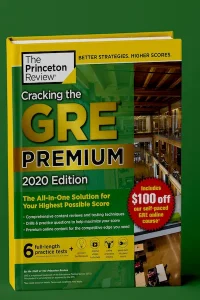Cracking the GRE Premium Edition 2020 : If you want to learn technique and methods to answer GRE question types, this book should be helpful. However, although it claims to be comprehensive in its coverage of the GRE, it is not (for math), and the practice questions in the book are not very realistic.
Before I get started, let me explain one of my premises: ETS, the company that creates the GRE, writes the most realistic practice questions, especially for verbal. Third-party companies’ questions (like this book’s) are not only less complex than the real thing, they have inconsistencies that can create confusion and worse, bad habits.
“Cracking the GRE Premium Edition 2020” Ok, here are a few thoughts:
1. I’ll start with the front cover’s claim that this is an “all-in-one solution for your highest possible score”. Though it would be nice if this were true, this book by no means will give you the quality of verbal practice you need nor the quantity (or quality) of math practice. As I’ll explain below, several math concepts the GRE might test are not covered in this book.
Tip: ETS’s books and tests will give you the most authentic verbal practice. Manhattan Prep’s 5-lb book is great for math repetition – and maybe some repetition for certain critical reasoning question types – and Khan Academy is really useful (and free) for those of you who are straight up bad at math.
2. The book thankfully recommends you practice with ETS material, but its advice is out-of-date by a few years. There are four ETS Powerprep tests on the ETS website, not two, and in addition to the ETS Official Guide, there are ETS math and verbal practice books.
Don’t listen to this book’s warning that the ETS Official Guide contains practice questions found on a free PDF – 99% of the hundreds of questions in the ETS Official Guide are unique to that book.
3. The realism of the practice tests and questions in this (or any) third-party book is uneven, and on the whole, is not good. This matters, since practicing with this material is unrealistic. Sure, it’s better than no practice at all, but you have limited time. Don’t waste that time with The Princeton Review’s material, especially for verbal. Math questions in this book are often too simplistic, too easy, and less reasoning-based than those written by ETS.
4. The explanation of verbal technique in the book is one of its strong points. I think the strategies described will benefit most people. Use the questions in the verbal chapters to understand the technique the book is teaching, but once you understand the technique, practice it with real ETS verbal questions.
5. The vocabulary chapter is fine. Just don’t believe anyone who claims they know the key words to learn, since no one knows which words will appear on your GRE – it’s just an educated guess. The chapter unfortunately is partially based on the pre-2011 GRE, which contained more obscure words (like tyro, or mephitic) that are unlikely to appear on the current test (per my educated guess).
6. The essay advice is pretty shallow, and is probably the least helpful advice in the book – there isn’t even a sample argument essay to learn from. But if you just need an average score, you might be ok with this chapter.
7. The back cover’s claim should actually read, “Most, but certainly not all, of what’s on the test is in this book”. Doesn’t really have the same ring to it, but at least it would be true. The book’s claim that “if it’s on the test, it’s in this book”, is what sets me off a little bit. False advertising, TPR. Why not just include all the math concepts? I hope you’ll improve the coverage of math concepts in future editions.
Here’s a list I put together of math concepts that ETS could test that are not taught in this book: sequences, normal distributions, similar and congruent triangles, work word problems, simple and compound interest, cube roots, trapezoids, sum of the interior angles of a polygon, quartile, and Venn diagrams. I did see, for instance, a sequence question in one of the practice tests, but I pity the student who has never seen one before trying to figure out sequences based on that question.
The Bottom Line
As I said before, if you need to learn technique for the GRE, this book is a good source. However, I recommend you use as few practice questions as possible in the book, and that you check out the ETS Math Review to get a clearer picture of additional math concepts the GRE might test that are not covered in this book.
Bonus tip: There are a few concepts in the ETS Math Review that are unlikely to be tested: calculating standard deviation, the quadratic formula, box and whisker plots, graph translations and stretches, parabolas, interquartile range, the equation of a circle.


